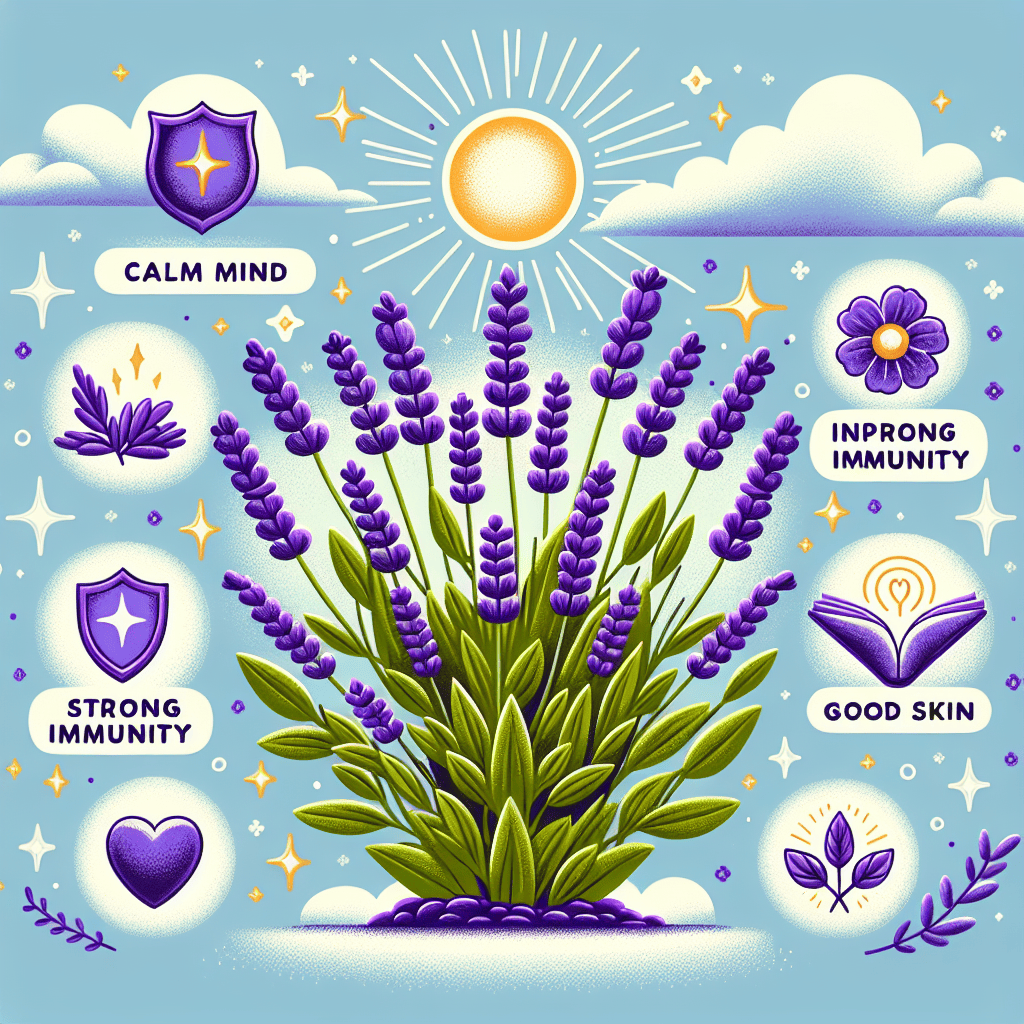Introduction: Lavender, also known as Lavandula, is a versatile herb with numerous potential benefits and applications. This comprehensive guide delves into the various aspects of lavender, including its therapeutic properties, uses, and precautions. From alleviating anxiety to reducing pain, lavender has been studied extensively for its health benefits. Join us as we explore the advantages and potential considerations associated with incorporating lavender into your wellness routine.
Table of Contents
Benefits of Using Lavender
Discover the wide array of benefits linked to using lavender as a therapeutic herb.
- Relieve Anxiety:
Lavender oil has gained attention for its remarkable ability to reduce anxiety levels. Research has demonstrated that the aromatic properties of lavender oil can have a calming effect on the mind and body, making it a popular choice for individuals seeking natural remedies for anxiety relief. By inhaling the scent of lavender oil or applying it to the skin, individuals may experience a decrease in feelings of stress and tension.
Moreover, the therapeutic benefits of lavender oil extend beyond anxiety relief. Studies have provided evidence of its effectiveness in managing various health conditions. For instance, lavender oil has been found to be useful in reducing symptoms of dysmenorrhea, a condition characterized by severe menstrual cramps. Additionally, its analgesic properties make it a promising option for alleviating post-surgical pain. The oil’s ability to diminish the risk of falls in the elderly highlights its potential in enhancing safety and mobility in older adults.
Furthermore, the versatile nature of lavender oil allows it to address a wide range of concerns. From psychological agitation and depression to physical discomforts like colic, migraines, and arthritis pain, lavender oil offers a natural alternative for relief. Pregnant women in labor have also benefited from the pain-relieving properties of lavender oil. Moreover, individuals struggling with conditions such as restless legs syndrome and high stress levels may find relief through the use of lavender oil. Its efficacy in combating lice infestations further demonstrates the diverse applications of this aromatic herb in promoting health and well-being.
- Lavender Herb Content:
Lavender herb, scientifically known as Lavandula, is well-known for its soothing and calming properties. It has been used for centuries in aromatherapy and traditional medicine due to its various beneficial compounds. Polyphenols, which are abundant in lavender, act as antioxidants that help protect cells from damage caused by free radicals, thereby reducing inflammation.
Flavonoids, another key component of lavender, are known for their anti-inflammatory and immune-boosting properties. These compounds can help modulate the immune response in the body and reduce inflammation, which may benefit those with conditions such as arthritis or skin irritation. Linalyl acetate and linalool are two components that give lavender its distinctive scent and are known for their calming and stress-relieving effects.
The use of lavender essential oil, extracted from the plant, has gained popularity in alternative medicine for its potential therapeutic effects. Inhaling the aroma of lavender oil or using it topically may help alleviate stress, anxiety, and insomnia. Additionally, the anti-inflammatory properties of lavender oil make it a popular choice for aromatherapy massage or as a natural remedy for headaches or muscle pain. Overall, the diverse mix of beneficial compounds found in lavender herb and essential oil make it a versatile and effective option for promoting relaxation and well-being.
The Harm of Lavender Herb
Explore the safety considerations and precautions associated with using lavender herb.
- The Safety of Lavender Herb:
When it comes to medications or supplements, it is essential to consider individual circumstances and health conditions. While most adults may safely use certain products, specific groups require extra caution. For instance, breastfeeding women need to be particularly careful about what they consume as it may affect the baby through breastmilk. Likewise, children who have not reached puberty are still growing and developing, which means certain substances might have different effects on their bodies compared to adults. Therefore, it is crucial for caregivers and healthcare providers to be mindful of these vulnerable populations and consult with professionals before giving them any medications or supplements.
Another critical group that should exercise caution when it comes to certain substances are individuals planning surgery. Certain supplements or medications can interact with anesthesia or other drugs used during the procedure, potentially leading to complications. It is crucial for anyone with upcoming surgery to inform their healthcare team about all the products they are taking to ensure a safe and smooth operation. Additionally, individuals with underlying heart conditions need to be careful with certain substances that can impact the central nervous system. These conditions can make individuals more susceptible to adverse effects, so it’s important to consult with a healthcare provider before using any new medications or supplements, especially if they affect the nervous system.
In summary, while many products are generally safe for most adults, it is crucial to remember that specific populations have unique needs and considerations. Breastfeeding women, prepubescent children, individuals planning surgery, and those with heart conditions should take extra precautions when using medications or supplements that may affect their health. Consulting with healthcare professionals, being transparent about upcoming surgeries or medical conditions, and carefully reading product labels are essential steps to ensure the safety and well-being of these vulnerable groups. By being mindful of these specific populations and their potential sensitivities, we can help prevent adverse effects and promote better health outcomes for everyone.
- Potential Drug Interactions:
Lavender, a popular herb known for its calming and soothing properties, can potentially interact with various medications. It is crucial to seek guidance from a healthcare provider before incorporating lavender into your health routine, especially if you are taking prescription medications or have specific health conditions. This precaution is essential to prevent any adverse reactions or interference with the effectiveness of your medications.
Certain health conditions may be particularly sensitive to interactions with lavender. For instance, individuals with hormone-sensitive conditions, such as breast cancer or hormonal imbalances, should be cautious due to lavender’s potential hormonal effects. Additionally, people with allergies or skin sensitivities should also exercise care when using lavender topically, as it can sometimes cause skin irritation or allergic reactions. Consulting a healthcare provider can help determine the appropriate dosage and method of use to minimize risks and maximize the benefits of lavender.
In some cases, combining lavender with certain medications may lead to unintended consequences. For example, lavender has been reported to enhance the effects of sedative medications, potentially causing excessive drowsiness or dizziness. Conversely, lavender may also interact with medications that are metabolized by the liver, affecting their breakdown and elimination from the body. By discussing your medication regimen and health history with a healthcare professional, you can receive personalized advice on how to safely incorporate lavender into your wellness routine without compromising your health or the efficacy of your medications.
Common Questions about Lavender Herb
Address frequently asked questions related to the uses and doses of lavender herb.
- Uses and Benefits:
Lavender is a versatile herb that finds its applications in various aspects of life. Apart from being a popular flavoring agent in food, it is also widely used as a perfumed ingredient in cosmetics, soaps, and other personal care products. The sweet and floral fragrance of lavender not only adds a delightful aroma to these products but also brings a sense of calm and relaxation to the user.
In addition to its role in flavoring and perfuming, lavender also offers a range of health benefits, especially for women. The herb has been traditionally used to provide relief from menstrual cramps, as its soothing properties can help decrease the intensity of the pain. During labor, lavender oil can be used to alleviate the discomfort of contractions and promote a sense of relaxation. Furthermore, for women experiencing menopausal symptoms such as hot flashes and mood swings, lavender may offer relief and help in managing these challenging transitions.
When using lavender for its therapeutic effects, it is essential to consider the appropriate dosage based on the desired outcomes. The permissible doses can vary depending on the method of consumption, whether it is through ingesting lavender as a tea or supplement, or using it topically as an oil or extract. Consulting with a healthcare provider or an herbalist can help determine the most suitable dosage for individual needs and ensure the safe and effective use of lavender for women’s health concerns.
- Available Products:
Lavender herb, beloved for its calming properties, is widely available in various forms such as oil, supplements, and tea. Lavender oil is popular for its soothing aroma and is frequently used in aromatherapy to promote relaxation and reduce stress. It can also be applied topically to ease headaches or muscle tension. However, when using lavender oil topically, it is important to dilute it with a carrier oil to prevent skin irritation. Ingesting lavender oil is not recommended unless under the guidance of a qualified healthcare provider.
Lavender supplements, on the other hand, offer a convenient way to incorporate the herb’s benefits into your daily routine. These supplements may help improve sleep quality, reduce anxiety, and promote overall well-being. It’s essential to follow the recommended dosage guidelines provided on the supplement packaging or by a healthcare professional to avoid any potential side effects. Additionally, it’s advisable to consult with a healthcare provider before starting any new supplement regimen.
Lastly, lavender tea is another popular option for enjoying the herb’s calming effects. Lavender tea is known for its relaxing properties and is often consumed before bedtime to promote better sleep. It can also help alleviate digestive issues and reduce inflammation in the body. While lavender tea is generally safe for most people, individuals with allergies to the Lamiaceae plant family, which includes mint and sage, should exercise caution when trying lavender tea for the first time. Overall, whether using lavender in oil, supplement, or tea form, it’s important to be aware of any potential contraindications and to use these products responsibly for optimal health benefits.




